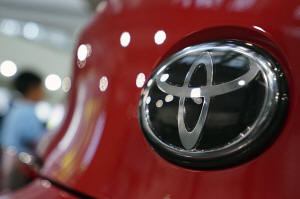Toyota's truck division Hino to pay $1.6 billion as part of emissions
scandal
 Send a link to a friend
Send a link to a friend
 [January 17, 2025] By
MICHELLE CHAPMAN [January 17, 2025] By
MICHELLE CHAPMAN
A Toyota division that manufactures trucks will pay more than $1.6
billion and plead guilty to violations related to the submission of
false and fraudulent engine emission testing and fuel consumption data
to regulators and the illicit smuggling of engines into the United
States.
Hino Motors, a subsidiary of the Toyota, first acknowledged in 2022 that
it has systematically falsified emissions data dating back as far as
2003.
That was part of a broader scandal involving emissions tests that
ensnared other automakers as well.
The Justice Department said that Hino's unlawful conduct allowed it to
improperly secure approvals to import and sell, and cause to be imported
and sold, more than 110,000 diesel engines in the U.S. from 2010 to
2022. The engines were primarily installed in heavy-duty trucks made and
sold by Hino nationwide.

“Hino knew the requirements that engines must meet to be certified to
operate in the United States, yet it falsified data for years to skirt
regulations,” Assistant Attorney General Todd Kim of the Justice
Department’s Environment and Natural Resources Division, said in a
prepared statement. “Hino’s actions led to vast amounts of excess air
pollution and were an egregious violation of our nation’s environmental,
consumer protection and import laws."
Hino Motors Ltd. has agreed to plead guilty to engaging in a multi-year
criminal conspiracy. The plea agreement, which is subject to court
approval, requires the company to pay a criminal fine of $521.76
million, serve a five-year term of probation — during which it will be
prohibited from importing any diesel engines it has made into the U.S. —
and implement a comprehensive compliance and ethics program and
reporting structure.
[to top of second column] |

In this Aug. 2, 2019, file, photo, people walk by the logo of Toyota
at a show room in Tokyo. (AP Photo/Eugene Hoshiko, File)
 Hino has also agreed to a forfeiture
money judgment against it in the amount of approximately $1.1
billion. As part of the plea deal, Hino’s future payments towards
its civil settlement obligations, as well future payments as part of
a civil class action settlement brought by private plaintiffs, will
be credited towards its criminal forfeiture money judgment
obligation.
The Justice Department, Environmental Protection Agency, FBI,
Customs and Border Protection, Department of Transportation’s Office
of Inspector General, National Highway Traffic Safety
Administration, and State of California reached criminal and
multiple civil resolutions with Japanese Hino, which are subject to
approval by the U.S. District Court for the Eastern District of
Michigan.
In separate civil resolutions of environmental, customs and fuel
economy claims by the federal government and the State of
California, Hino will pay a civil penalty of $525 million.
Hino, as part of its plea agreement, admitted to submitting and
causing to be submitted false applications for engine certification
approvals between 2010 and 2019. The company also admitted that it
submitted fraudulent carbon dioxide emissions test data.
Hino said in a statement on Thursday that its agreements resolve all
of the company’s outstanding legal issues in the U.S. related to its
legacy emissions issues.
"We deeply apologize for the inconvenience caused to our customers
and stakeholders. In order to prevent a recurrence of this kind of
issue, we have implemented company-wide reforms, including
meaningful improvements to our internal culture, oversight, and
compliance practices,” CEO Satoshi Ogiso said.
All contents © copyright 2025 Associated Press. All rights reserved |